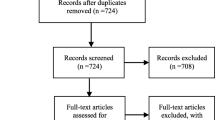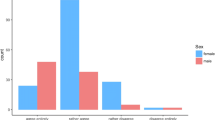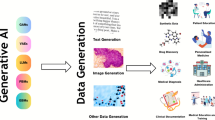Abstract
Information technology is growing at a tremendous rate, becoming a part of all aspects of the practice of psychiatry. Medical informatics is the study of the use of information in medicine. As information management becomes a greater part of the definition of psychiatric practice, it becomes critical that an understanding of medical informatics principles as applied to psychiatric practice should be incorporated into psychiatric residency training. The authors outline the components and objectives of such a curriculum, focusing on basic tasks of patient care, communication, education, and practice management. The authors conclude with a discussion of issues affecting implementation, including assessment of resources and program planning.
Similar content being viewed by others
References
Alessi N, Huang M, Quinlan P: 2005: information technology impacts psychiatry, in American Psychiatric Press Review of Psychiatry, Vol 16, edited by Dickstein LJ, Oldham JM, Riba MB. Washington, DC, American Psychiatric Press, Inc., 1997, pp VI 69–87
Muller S et al.: Part II. Physicians for the twenty-first century: report of the project panel on the general professional education of the physician and college preparation for medicine. Journal of Medical Education 1984; 59:1–208
Koschmann T: Medical education and computer literacy: learning about, through, and with computers. Acad Med 1995; 70: 818–821
Austin CJ, Sobczak PM: Information technology and managed care. Hospital Topics 1993; 71:33–37
DesHarnais S, Marshall B, Dulski J: Information management in the age of managed competition. The Joint Commission Journal on Quality Improvement 1994; 20:631–638
O’Connor K: Information management for managed care. Medical Group Management Journal 1995; 42:52–75
Douglas JT: Group practice computing: the road to managing information. Medical Group Management Journal 1994; 41:14–16, 18, 42
Blois MS, Shortliffe EH: The computer meets medicine: emergence of a discipline, in Medical Informatics: Computer Applications in Health Care, edited by Shortliffe EH, Perrault LE. Menlo Park, CA, Addison-Wesley, 1990, pp 3–36
Collen MF: A History of Medical Informatics in the United States, 1950 to 1990. Indianapolis, IN, American Medical Informatics Association, 1995
Greenes RA, Shortliffe EH: Medical informatics: an emerging academic discipline and institutional priority. JAMA 1990; 263:1114–1120
Lorenzi NM, Gardner RM, Pryor TA, et al: Medical informatics: the key to an organization’s place in the new health care environment. Journal of the American Medical Informatics Association 1995; 2:391–392
Alessi N, Huang M: University of Michigan On-Line With 1st Psychiatric Informatics Fellowship. Psychiatric Times 1995; August, pp 34–35
Ball MJ, Douglas JV: Informatics programs in the United States and abroad. MD Comput 1990; 7: 172–175
Dickhaus H: A comparative summary of six health/medical informatics programs. Methods of Information in Medicine 1994; 33:254–257
Frisse ME: Medical informatics in academic health science centers. Acad Med 1992; 67:238–241
Rootenberg JD: Information technologies in US medical schools: clinical practices outpace academic applications. JAMA 1992; 268:3106–3107
Shortliffe EH: Medical informatics meets medical education. JAMA 1995; 273:1061, 1064–1065
Bauer DW, Cree J: Results from the use of a 3-year computer competency curriculum in a family practice residency. Fam Med 1995; 27:20–27
Hogg WE: A medical informatics course as part of residency training in Canada. MD Comput 1993; 10:361–363
Juels CW, Kramer TAM: Psychiatric residency directors’ use of computers in their training programs. Academic Psychiatry 1994; 18:81–87
Huang MP, Alessi NE: The internet and the future of psychiatry. Am J Psychiatry 1996; 153:861–869
Huang MP, Alessi NE: Challenges of the World Wide Web. Psychiatr Serv (in press)
Manley MRS: An emerging consensus in behavioral science course content. Academic Psychiatry 1994; 18:30–37
Paterson GI, Kaufman DM: Medical informatics and problem-based learning in conjunction. Medinfo 1995; 8, pt 2:1149–1153
Shapiro JJ, Hughes SK: Information technology as a liberal art. Educom Review 1996; 31:31–35
Haynes RB, Ramsden M, McKibbon KA, et al: A review of medical education and medical informatics. Acad Med 1989; 207–212
Author information
Authors and Affiliations
Corresponding author
Rights and permissions
About this article
Cite this article
Huang, M.P., Alessi, N.E. An Informatics Curriculum for Psychiatry. Acad Psychiatry 22, 77–91 (1998). https://doi.org/10.1007/BF03341909
Published:
Issue Date:
DOI: https://doi.org/10.1007/BF03341909




